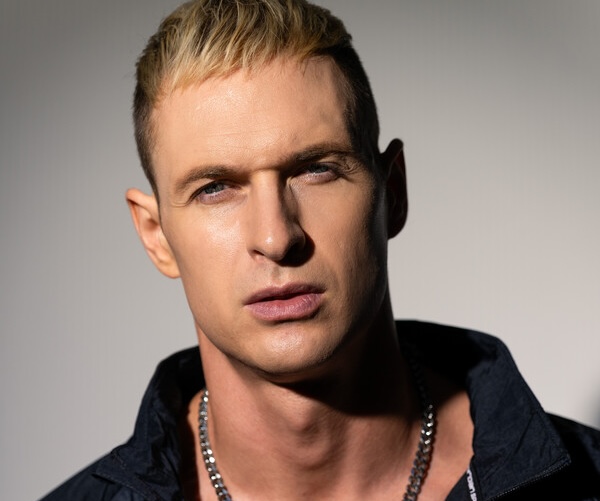(Translated from Korean)
DJ Fenner, born in London, England, is a producer and DJ who, influenced heavily by his music-loving father, combined his university major in IT with his music career to compose, arrange, and produce.
In 2022, during the Seoul International Fireworks Festival, which lit up the Han River in rainbow colors, he delivered an exhilarating performance that gave young people a sense of liberation after the long tunnel of COVID-19. On New Year’s Day 2024, at DDP (Dongdaemun Design Plaza), he played his own creation, KPOP KRACKED, offering uplifting music to welcome in a hopeful new year.
He has traveled to numerous university festivals across the country, delivering exciting dance music. Not only does he work with K-pop, but he also fuses even traditional Korean pansori with electronic dance music, expanding his reach globally.
Having spent time closely with Korean friends, he has become fluent in Korean. He comments that Korea’s unique “hyung-nim” (older brother) culture has both positive and negative sides. This British man with gray eyes says that Korea is like a tree that gives him opportunities for growth. We explore the story of Fenner’s journey to settle in Korea.
Yoon Kyung-min: As a foreigner living in Korea, what kind of difficulties have you experienced?
Fenner: Honestly, the problems are pretty much the same everywhere in the world. The language barrier is the biggest one. That’s why learning the language is crucial. Especially when it comes to using online services like banking apps or signing up for things—it’s extremely difficult. The vocabulary used is uncommon, and you’re often in a rush or under pressure when trying to register on a website.
Q: You speak Korean so fluently—it seems like you’ve lived here for 14 years! It must have been difficult at first. How did you learn?
A: I picked it up while hanging out with my Korean friends. I’m the kind of person who forgets boring things quickly but remembers anything funny. When I hung out with Korean club friends and they were joking around, I often couldn’t understand and would ask, “What does that mean? Why is everyone laughing?” It was like hard training. Imagine this: drinking soju with heavy-drinking Korean clubbers for five hours, speaking only in fast Korean. My brain was on fire! (laughs)
It was tough, but worth it. Whenever I didn’t understand something, my friends would explain it to me. I started making a list of words and phrases I found funny. Over the years, I’ve learned a lot of slang—so much that my Korean slang is probably better than most Koreans’. That’s what happens when you hang out with awesome people in the entertainment industry. (laughs)
I’m truly grateful to all of them. I believe life is about people, and when you laugh and have a good time, that’s how you build real relationships and strong networks.
Q: You made a list of funny Korean expressions? Can you share a few?
A: Funny ones? Let’s see… If I say “케바케” (case by case), people laugh. There’s also “낄끼빠빠”—which means “join when it’s time to join, leave when it’s time to leave.” If our “gag codes” match, I can totally “멘붕 시켜” someone (mentally crash them—used humorously). Then there are lines like “개도 밥 먹을 땐 안 건드려” (“Even a dog shouldn’t be bothered when it’s eating”), “이불킥” (kicking the blanket out of secondhand embarrassment), and “헛똑똑이” (someone who seems smart but isn’t).
If you say them at the right moment, they come off as jokes and make people laugh. Maybe it’s kind of like an SNL vibe? When a foreigner uses slang like “멘붕”, people find it hilarious. (laughs)
Q: Any cultural misunderstandings between the UK and Korea you’d like to share?
A: The only real challenge for me has been the hyung-dongsaeng (older-younger) hierarchy. There are positives, like how older people can help settle issues—say, when someone gets too drunk and causes trouble. But in my field, people often abuse that power. I’ve met people who tried to use their age to take advantage of me.
Having grown up and been educated in the UK, I believe all adults should be respected equally regardless of age.
Q: It’s true that Korea’s Confucian culture gives older people a sense of entitlement. How do you deal with overly authoritative behavior?
A: I’ve developed my own way of navigating relationships from the start—partly to avoid being used, and also to figure out who’s genuinely kind. I mix in a little English when I speak. Since English doesn’t have honorifics, it helps me gauge how people interact in a neutral, respectful way.
I also joke around a lot to signal that we don’t need to be overly formal with each other. If someone is kind, fun, and not domineering, I sometimes end up calling them hyung (older brother). That way, I’ve filtered out the toxic people from my business network. Now, I only work with people who respect me and treat me as a real partner or friend.
These challenges pushed me to study more, and now my Korean is good enough to hold my ground even in delicate social situations.
Q: What do you love most about Korea, and why?
A: I really love Korea. The best thing is the public transportation—it’s cheap and punctual. My MBTI is “J,” actually “super J” (laughs), so punctuality is crucial for me. Especially as a freelancer, being able to get around and meet people efficiently really matters.
In the UK, public transport and taxis are expensive, so you hesitate to go places. You think twice before making plans.
Q: Other than transportation, what’s more convenient in Korea compared to the UK?
A: Besides the well-organized buses and subways and relatively cheap taxis, there’s just a higher level of overall convenience. In London, public transportation is expensive, so people don’t move around much. In Seoul, everything is accessible, affordable—it makes life so much easier.
Also, convenience stores are literally everywhere. You can always get what you need. And it’s safe enough to walk around at night.
Q: How’s public safety in Korea?
A: It’s amazing. I can leave my phone on a café table and go to the bathroom—and it’s still there when I come back! No one takes it.
Q: What would happen if you left your phone unattended in the UK?
A: It’d be gone immediately. Someone would definitely steal it. There are a lot of thieves in the UK, especially in big cities like London. I think many Koreans who’ve lived in the UK have experienced this—leave your laptop at a café table, come back, and it’s gone. Welcome to the UK! (laughs)
Q: Have you ever seen fights or confrontations in bars or on the street?
A: In the UK, you’ll see thuggish guys intimidating people. In Korea? Almost never. In the UK, people throw their weight around with physical force. In Korea, it’s more like “age-based power.” Korea feels especially safe to me, and I love that.
Sometimes, when I’m with foreign friends on the bus or train, I notice how loud they talk. Maybe it’s the DJ in me, but I can sense the volume difference between them and the locals. (laughs) I often tell them they’re being loud. Maybe I’m getting old? (laughs)
Q: Any cultural mishaps between Korea and the UK?
A: In the UK, if someone drops or breaks a glass at a bar, people cheer and clap. I thought that was fun. But in Korea, people just go silent and stare awkwardly. I used to think clapping would lighten the mood, but now I worry people will think I’m being rude—so I’ve stopped.
Q: Any advice for young Koreans who want to go abroad?
A: Travel as much as you can while you’re young. Life is short. (laughs) Go see the places you’ve always dreamed of. Do the things you’ve always wanted to do. But don’t wander aimlessly—be curious. They say “you see what you know,” right?
You might be more spontaneous than I am, so I won’t say you have to study a lot before traveling. But stay curious—let something inspire you, like it did for me. I always wanted to see Machu Picchu and the Amazon, so for my 30th birthday, I went. It felt like I’d fulfilled a part of my soul.
Q: What does Korea mean to you?
A: To me, Korea is like a tree that gives me opportunities to grow. I came here right after university just to travel—I never expected it would become the place where I’d build myself. I’ve been DJing since I was 13, but I never imagined I’d come to the land of K-pop and grow two brands—DJ Fenner and KPOP KRACKED—and tour globally.
After 15 years here, I’ve had so many opportunities and I keep growing to seize even bigger ones. Korea is the country that helps me take step after step toward my dreams.
So yes, I can confidently say:
“To me, Korea is an opportunity to grow and a place where I can realize my dreams.”
Yoon Kyung-min: Thank you for the interview. I hope you continue to grow even more here in Korea.
Original source of article in Korean by LG Hello TV News can be found here: https://news.lghellovision.net/news/articleView.html?idxno=504169

